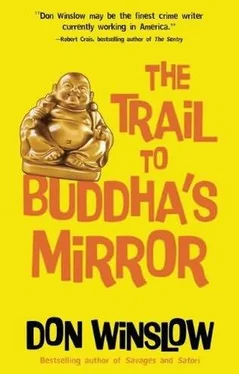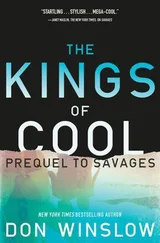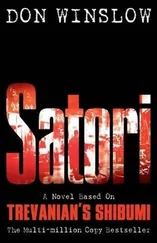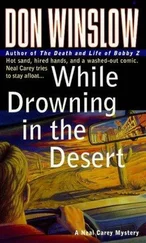Don Winslow - The Trail to Buddha_s Mirror
Здесь есть возможность читать онлайн «Don Winslow - The Trail to Buddha_s Mirror» весь текст электронной книги совершенно бесплатно (целиком полную версию без сокращений). В некоторых случаях можно слушать аудио, скачать через торрент в формате fb2 и присутствует краткое содержание. Жанр: Триллер, на английском языке. Описание произведения, (предисловие) а так же отзывы посетителей доступны на портале библиотеки ЛибКат.
- Название:The Trail to Buddha_s Mirror
- Автор:
- Жанр:
- Год:неизвестен
- ISBN:нет данных
- Рейтинг книги:3 / 5. Голосов: 1
-
Избранное:Добавить в избранное
- Отзывы:
-
Ваша оценка:
- 60
- 1
- 2
- 3
- 4
- 5
The Trail to Buddha_s Mirror: краткое содержание, описание и аннотация
Предлагаем к чтению аннотацию, описание, краткое содержание или предисловие (зависит от того, что написал сам автор книги «The Trail to Buddha_s Mirror»). Если вы не нашли необходимую информацию о книге — напишите в комментариях, мы постараемся отыскать её.
The Trail to Buddha_s Mirror — читать онлайн бесплатно полную книгу (весь текст) целиком
Ниже представлен текст книги, разбитый по страницам. Система сохранения места последней прочитанной страницы, позволяет с удобством читать онлайн бесплатно книгу «The Trail to Buddha_s Mirror», без необходимости каждый раз заново искать на чём Вы остановились. Поставьте закладку, и сможете в любой момент перейти на страницу, на которой закончили чтение.
Интервал:
Закладка:
“Show him around the city again today,” Xao ordered. “If all stays quiet, take him to the countryside tomorrow.”
“Yes, Comrade Secretary.”
“Good morning.”
Peng turned on his heel with the curt dismissal. Perhaps Comrade Secretary Xao will learn more courtesy when I have the opportunity to interrogate him. Perhaps I shall ask him to light my cigarettes and watch me smoke them.
But first to put them all together-the woman, the scientist, and the persistent young American. Yes, gather them at the scene of Xao’s intended treason, these three strands of the rope with which Xao will hang himself.
Patience, he cautioned himself. Move slowly. Let Xao think it is safe.
Xao waited until Peng had left and then called in his driver.
“How is it?” Xao asked.
“Wu and the American get on well. They are becoming friends.”
“Good. Good. You will be their driver again today.”
The driver nodded deferentially. Xao handed him the pack of cigarettes and motioned him out the door.
I would have more men like him, Xao thought, instead of that snake Peng. He is not clever enough to win, just clever enough to cost me resources and trouble. But he has his uses.
“Good morning, cocksucker,” Wu said.
“Good morning, motherfucker.”
Wu giggled with delight and opened the car door for Neal.
“Today we see the east side of the city,” Wu announced.
They started with the zoo.
Neal Carey liked a zoo as much as the next guy, provided the next guy thought that they were among the most depressing places on earth. He understood that they were necessary, probably even beneficial, in that they were used to breed species that mankind had succeeded in almost wiping out. He also knew that the animals in zoos spent their days pretty much the way their cousins did in the wild, sleeping and eating. There was just something about looking into cages-or even over the hedges and moats that the enlightened Chengdu Zoo featured-at the individuals of another species, that downright demoralized him.
Nevertheless, he feigned polite interest at the golden monkeys, the speckled deer, and the gibbon apes that led up to the featured attraction, Sichuan’s own giant pandas. The two pandas had their own entire section, an “environment” of rocks and bamboo separated from the admiring public by a high railing and a moat. The pandas didn’t actually do much, just sat there eating bamboo and looking back at the gawkers.
Wu was quite enthusiastic and gave Neal a thorough rundown on the history, physiology, and behavior of the giant panda, as well as on the government’s efforts to save it from extinction. This was followed by a complete history of the Chengdu Zoological Association and its tribulations during the Cultural Revolution. Even the pandas had not been immune from political analysis, and might well have been liquidated as a symbol of bourgeois preoccupation with pets had not it shared a name with the Chairman-the Chinese name for panda being “bear cat,” Shr Mao-and hence been immune from criticism. It was true that certain radical Red Guards had seen the zookeepers’ confinement of the panda as symbolic of the bureaucracy’s hemming in of Mao Tse-Tung, and demanded that the pandas be set free, but the zookeepers trumped them with an offer to release the pandas along with all the other mao, such as lions, leopards, and tigers, on the condition that the Red Guard open these cages themselves. The Guard declined.
“Too bad,” Wu muttered. “I would like to have seen those bastards try to put a dunce cap on a tiger.”
“Did they do that to your father?” Neal asked.
“Yes.”
“I’m sorry.”
“It doesn’t matter.”
Neal didn’t answer, but from the hard, angry look on Wu’s face he knew that it mattered. Big time.
They strolled through the zoo for a while longer, eating peanuts in place of lunch as Wu described the natural history, habitat, and folklore of every animal in the zoo.
“I never knew my father,” Neal said as they neared the parking lot.
“You are a… bastard?” Wu asked. He was shocked, not only by the fact, but that Neal would choose to reveal it.
“Yeah.”
“I am sorry.”
“It doesn’t matter.”
Wu shook his head. “In China, family is everything. We are not so much individuals as we are family. A person will happily sacrifice his life to ensure that the family survives. Do you have no family?”
“No family,” answered Neal. Unless, he thought, you counted Joe Graham and Ed Levine, Ethan Kittredge, and Friends of the Family.
“No brothers or sisters?”
“Not that I know about.”
“That is very sad.”
“Not if you don’t know any different.”
I guess.
“Perhaps not.”
Wu was quiet as they drove away from the zoo, and he provided only cursory narration for the scenery of apartment blocks and factories that made up the northeastern part of the city. He brightened a little as they came to Sichuan University.
“What university did you attend?” he asked.
“Columbia, in New York City.”
“Ah,” said Wu politely, although he had clearly never heard of it. “What did you study?”
“Eighteenth-century English literature.”
“Qing Dynasty.”
“If you say so.” “I have read some Shakespeare.”
“Oh, yeah? Which?”
“Julius Caesar. It concerns the oppression of the masses by first a militarist dictator and then a capitalist oligarchy.”
“Are you kidding?”
“No.”
“Do you believe all that?”
“Of course.”
“So what is Huckleberry Finn about?”
“Slavery and the rejection of bourgeois values. What do you think it is about?”
“A boy on a river.”
“Whose thinking is correct?”
“You have your interpretation and I have mine. One isn’t any better or worse than the other. We’re both right.”
Wu chuckled and shook his head. “What you say is impossible. Thought is either correct or incorrect. Two different interpretations cannot be right. One must be right and the other wrong.”
“They’d love you at Columbia.”
“Yes?”
“Fuck yes.”
Wu laughed but then looked serious and said, “You are joking with me, but I think this is the difference between our two cultures. I believe that wrong thought leads to wrong action. Therefore, it is very important that people be taught correct thought. Otherwise, how will they know how to act correctly? I think in your society, you believe that it is bad to insist on correct thought, but then, because your people do not have correct thoughts, they perform bad actions. This is why you have so much crime and we do not.”
Neal almost answered that it is also why China could have a Cultural Revolution and the States couldn’t, but he stopped. He didn’t want to hurt Wu’s feelings.
“We just don’t believe that there is only one way to think.”
“Exactly.”
“I have a correct thought,” Neal said.
“What is it?”
“Let’s go out for dinner tonight. Can you arrange it?”
“I do not have money,” Wu said unabashedly.
“I do,” Neal said. Mr. Frazier had come to China loaded.
“I think that your thought is a correct one, then,” Wu answered. “Would you like to eat at the Hibiscus?”
“Wherever you say.”
“It is the best.”
“The Hibiscus it is.”
But before the Hibiscus, there was more touring. They hit the Cultural Palace, the People’s Market, and the River View Pavilion, where an enormous terrace overlooked the Min River. It seemed to Neal that they were covering the entire city, putting shoe leather to every public place; the whole scene reminded him of a fisherman who casts his lure all over the pond, hoping for the big fish to strike.
Читать дальшеИнтервал:
Закладка:
Похожие книги на «The Trail to Buddha_s Mirror»
Представляем Вашему вниманию похожие книги на «The Trail to Buddha_s Mirror» списком для выбора. Мы отобрали схожую по названию и смыслу литературу в надежде предоставить читателям больше вариантов отыскать новые, интересные, ещё непрочитанные произведения.
Обсуждение, отзывы о книге «The Trail to Buddha_s Mirror» и просто собственные мнения читателей. Оставьте ваши комментарии, напишите, что Вы думаете о произведении, его смысле или главных героях. Укажите что конкретно понравилось, а что нет, и почему Вы так считаете.












